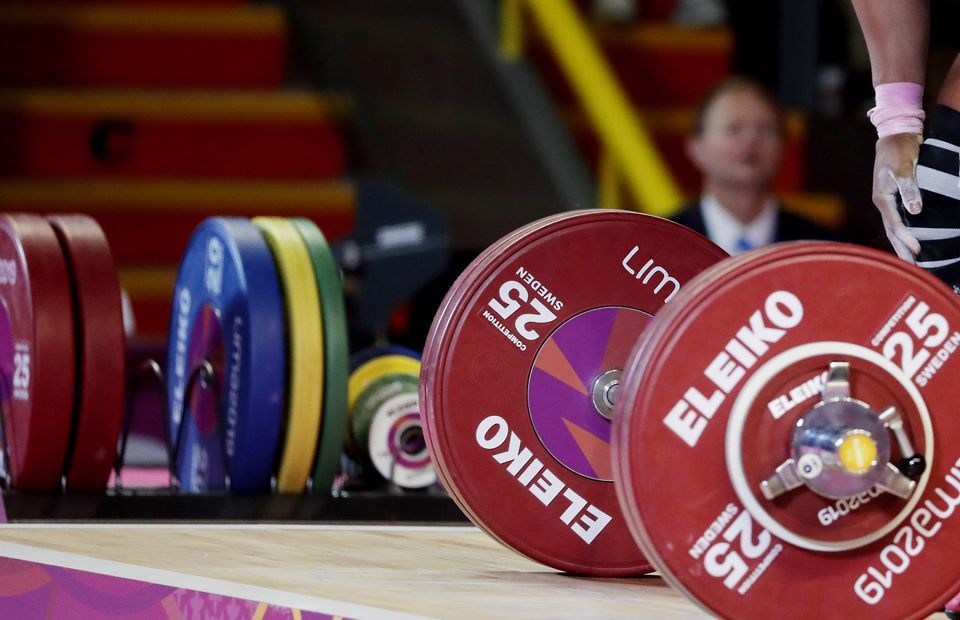As Ramadan, the holy month for Muslims, comes to an end, GiveMeSport Women takes a look at the effects it has on female Muslim athletes.During the month of Ramadan, Muslims must refrain from food and drink during daylight hours for 29 to 30 days. In the UK this year, this means Muslims must fast for 18 hours at a time. Ramadan is also a time of spiritual reflection, self-improvement, and heightened devotion and worship to God. Fasting is primarily done as a religious practice, but there are many health benefits gained when fasting.This season, many fans have become aware of male athletes in the Premier League fasting during games and training, including Manchester United's Paul Pogba, Leicester City's Wesley Fofana, Chelsea’s Antonio Rudiger and many more. However, not a lot of focus has been put on the effects Ramadan has on female athletes. GiveMeSport Women spoke to two inspirational athletes on the effect Ramadan had on their training. Amna Al Haddad is a female weightlifting athlete from the United Arab Emirates. She made history by being the first Emirati and Gulf Cooperation Council national to compete in the Asia Regionals, and the only Muslim woman to do so in a headscarf and a unitard.In 2015, Al Haddad became the first Emirati female individual athlete to be signed on by Nike and contributed to the country’s qualification for the Rio 2016 Olympic Games. She is now a champion for change and is often invited as a keynote speaker and panelist to discuss sports, mental health, and female empowerment.Kulsoom Abdullah is a Pakistani-American athlete who became the first female weightlifter to represent Pakistan when she competed at the 2011 World Championships. In the same year, she made history by becoming the first woman to compete in a hijab (head scarf).She also covered her arms and legs in accordance with her religious beliefs. As a result, the International Weightlifting Federation changed their rules to accommodate her request to do so.
Amna Al Haddad is a female weightlifting athlete from the United Arab Emirates. She made history by being the first Emirati and Gulf Cooperation Council national to compete in the Asia Regionals, and the only Muslim woman to do so in a headscarf and a unitard.In 2015, Al Haddad became the first Emirati female individual athlete to be signed on by Nike and contributed to the country’s qualification for the Rio 2016 Olympic Games. She is now a champion for change and is often invited as a keynote speaker and panelist to discuss sports, mental health, and female empowerment.Kulsoom Abdullah is a Pakistani-American athlete who became the first female weightlifter to represent Pakistan when she competed at the 2011 World Championships. In the same year, she made history by becoming the first woman to compete in a hijab (head scarf).She also covered her arms and legs in accordance with her religious beliefs. As a result, the International Weightlifting Federation changed their rules to accommodate her request to do so.
Studies have shown that most people who fast during Ramadan will experience mild dehydration, which may cause headaches, tiredness and difficulty concentrating. So, when you add training into the mix, it makes you wonder how these athletes manage it.
Al Haddad spoke with GiveMeSport Women about the adjustments she makes due to Ramadan. Al Haddad highlighted the importance of intuitive exercise and making sure she is conscious of how her body reacts whilst training in Ramadan.
“One of the main things I would normally focus on is reducing the volume but keeping the intensity that is something I have found to be very beneficial during Ramadan and my body adapts to it very well,” she said.
Increased intensity training during Ramadan limits energy expenditure and helps athletes like Al Haddad maintain their strength.
In Ramadan, most Muslims are cautious about what time they choose to exert the most energy. Like many Muslims around the world, the Arab ex-Olympian chooses to train “2-3 hours after iftar”. Iftar is when Muslims break their fast, which is in accordance with the time the sun sets. In the UK this is normally around 8:30pm.
Pakistani-American weightlifter Abdullah alters her schedule to suit her and aims “to train 2 hours before iftar” as she “does it closer to the time I get to break my fast so that I don't work out and be thirsty for a long period of time.”
Al Haddad tries to “keep the session short because there is not enough time to do things in Ramadan like work out as there are other priorities”. For Muslims, this month is an important time to get closer to God and try to devote themselves to salah (prayer) and recite more of the Quran.
Suhoor is an Islamic term referring to the meal consumed early in the morning by Muslims before fasting. This is the last time Muslims athletes can eat before starting their fasts. For many athletes, suhoor is very important as this is the last time they can consume energy-filled food to help them with training throughout the day.
The types of food you consume will inevitably determine your energy levels throughout the day. Recent studies have shown that the simple and complex carbohydrates consumed at suhoor will provide energy for the first eight hours of the day.
For Al Haddad, the pre-dawn meal is essential. “At suhoor, on the days I work out, I would try to eat some carbs, protein or fat,” she explained.
If I am not working out on that day, I would try to eat something light like eggs and milk.
Suhoor is undoubtedly the most important meal in Ramadan. Abdullah explains. “For suhoor I usually try to make sure I have enough protein – ones that are easily digestible, so I usually eat eggs or yogurt. I also have some chicken, but I make sure I chew everything properly.”
“I have been eating chia seeds and have them with yogurt - it's been helping me when I have it for suhoor to help with having sustained energy and to satisfy thirst for a long period of time.”
Chia seeds are one of the most nutritious superfoods on the planet and are packed with Omega-3s, complete protein, fiber, potassium and so much more. It was the Tarahumara Indians of Mexico’s Copper Canyon who introduced chia seeds to their diet prior to long distance runs.
The effect Ramadan has on the level of training varies from different athletes. Some believe that Ramadan improves their level of training, but for others that is not quite the case. A study conducted on 'The Optimal Time of Day for Training during Ramadan' presented conflicting results.
The study showed that for some athletes, Ramadan did not affect sports performance, but there was a significant decrease in sports performance for other athletes.
For Al Haddad it was beneficial. “In the past I have seen a degree of improvement in my training during Ramadan,” she said. “It is the result of giving your body a break but also shocking your system and when you shock your system you have to adapt.”
Abdullah finds her performance is impacted by her fast. “In some ways [the level of performance] does go down for the explosive lifts,” she said.
The 48 kilogram class lifter uses the same weights but decreases the amount of reps she does to complete that part of her training. She finds the heavier weights require timing, speed and position, and subsequently more mental energy.
In Ramadan I don't see a change in the amount I can lift when doing the supplementary strength lifts like the deadlift or squats. I do notice that the volume decreases, however the weights do not.
One advantage for Abdullah in fasting during Ramadan is she “does not have to worry about digestion energy while I'm training.”
For many, maintaining energy levels in Ramadan can be one of the most difficult battles of the month. Because of this, staying motivated to get up and train can test even the strongest.
The effects of fasting while training is both a mental and physical challenge. Abdullah revealed that: “I might feel tired but once I start, I'm ok”. The physical challenge is “the neurological muscular motion that plays a part when doing explosive lifts.”
Not only does fasting affect your physical ability to perform to your best, it also affects your sleeping schedule. You normally have to wake up to eat your last meal for the day (suhoor) at around 3:30 am. As a result, this affects motivation.
“When I am fasting, I will have a tiredness but a different kind - fasting tired,” Abdullah said. “During Ramadan I remind myself if I don't move or do any sort of training, it will affect me in other things like my sleep.”
For Emirati weightlifter Al-Haddad, she “looks at Ramadan as a reset time to focus on my overall spiritual and emotional health, a reminder that my body has a right too and it’s a chance to improve on things that could be adjusted.
“That motivates me to make better food choices and continue exercising,” she continued. “Once you train your willpower to take positive action, with time, it becomes a habit.”
Major competitions like the World Championships can be even more difficult for Muslim athletes during Ramadan. Recently, Brooklyn Nets point guard Kyrie Irving spoke about the difficulties adjusting to Ramadan. Irving spoke about the “mental strength” needed to keep up during competitive games.
For Abdullah, the Ramadan leading up to the 2011 World Championship required a similar amount of mental strength due to the long hours and the hot weather conditions.
“I was already used to fasting and working out, but the daylight hours were longer during the 2011 Ramadan and the weather was hotter – it was a bit of a challenge,” she explained.
“I was training in places that didn’t have any air conditioner – the situation has changed since then.” She quickly had to become accustomed to the conditions, and despite the initial challenges, eventually Abdullah “adapted and got use to it”
After speaking with a sports psychologist to break down potential mental barriers, Abdullah is aiming to qualify for her female age group and her weight class in the 2022 Nation Masters Championships in Salt Lake City in Utah. She also hopes to attend the 2022 IWF World Masters in Orlando in Florida.
Al Haddad was a contributed author to a youth-aimed book called The Possibilities Project. She is an advocate for mental health, and often discusses the importance of self-care. Al Haddad is also a Youth Mentor and has plans to connect with more young people.

















